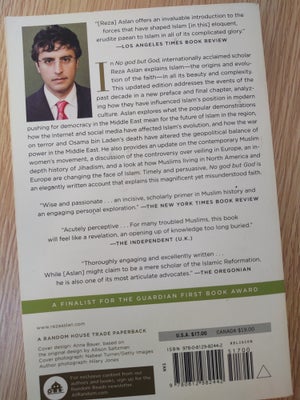
It’s the centuries of men who came after him who seem bent on backlash.) Aslan argues that Islam can-indeed must-“be used to establish a genuinely liberal democracy in the Middle East.” But the democracy he envisions is not a colonial democracy, imported from Europe or America. (Muhammad emerges here almost as a proto-feminist. Aslan paints the Prophet’s teachings in a compelling light: not unlike Jesus (Aslan does make explicit comparisons between Islam, Judaism, and Christianity), Aslan’s Muhammad was fiercely concerned with the rights of the oppressed and marginalized but many Muslim scholars who came after Muhammad were just as fiercely concerned to evade the egalitarian implications of the Prophet’s teaching. Second, there is real possibility for democracy in the Middle East.

What we really have, Aslan says, is a clash of monotheisms, competing particularistic, and often exclusive, claims about the nature of God, revelation, and prophecy. First, Samuel Huntington’s Clash of Civilizations-the theory most pundits have gravitated toward since 9/11-is an inadequate description of the current world scene. But these helpful expositions are just the starting point for making two arguments. of Iowa) and New York Times Middle East consultant, walks through the life of the Prophet, the redaction of the Qur’an, and the Five Pillars that are fundamental to Muslim life and practice. Aslan, a professor (Islamic and Middle Eastern Studies/Univ. If it accomplished nothing else, Aslan’s first book would be worthwhile for its clear expositions of the basics of Islamic history and Muslim thought. YA, adult)Ī lively and accessible introduction to Islam. Nonetheless, the author offers a rare and lucid vision of early Islam from the inside, capped with a heartening (for many Westerners) contention that modern Muslim radicalism isn’t on the rise but actually in its dying throes. Following that, though, the narrative fragments into a series of informative but less cogent essays on narrower topics, including the power struggle among Muhammad’s successors, the true meaning of “jihad” (no, not “Holy War”), the strong links between Islam and Judaism and the status of women in Islam. The author describes the early Arabic cultural and religious milieu, separates (scanty) fact from legend in tracing Muhammad’s life and shows how Islam developed from a strong call for social and economic reform to a “revolutionary experiment” that profoundly and successfully challenged established traditions in every area of Arab society and government.

The early chapters lay a strong foundation for understanding Islam’s essential tenets and character. Aslan reworks his illuminating and readable No God but God: The Origins, Evolution, and Future of Islam (2006) for a slightly younger audience with mixed success.


 0 kommentar(er)
0 kommentar(er)
